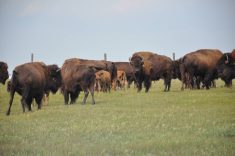HALIFAX – The Canadian Cattlemen’s Association has decided to include more nonproducers in its decision-making.
Board members approved a new constitution Aug. 17 that recognizes the need for ad hoc committees to debate policy that affects sectors beyond the farm or feedlot.
The emerging biofuel debate is an example.
Depending on the issue, representatives from sectors such as cattle dealers, auctions and truckers could be invited to sit on the committees.
The CCA also created a new committee on value creation and competitiveness, which is meant to consider emerging issues.
Read Also

Trump’s tariffs take their toll on U.S. producers
U.S. farmers say Trump’s tariffs have been devastating for growers in that country.
The changes flow from complaints during the BSE crisis that sectors not included in the CCA structure but affected by the crisis had no say in policies that were being developed by CCA and government.
“There were groups that didn’t feel they had enough input or influence on decisions and policies that were affecting them during BSE,” CCA past-president Stan Eby said in an interview during the association’s semi-annual meeting where the new constitution was discussed and approved.
A consultant was hired in response to the complaints to determine if structural changes were needed.
Eby said it was decided that a way could be found to be more inclusive.
“A good example is the debate we’re now having on rules around traceability,” he said.
“These will influence everyone in the chain and they want a say. An ad hoc committee structure could accommodate that.”
The CCA is also establishing a leaders’ forum involving representatives from various connected sectors who will meet at least once a year to discuss issues and arrange conference calls when needed. The first forum will be held in Calgary Oct. 3.
“I often said during my time as president that we have created a lot of good pieces of policy and process,” Eby said. “But how do we pull them all together? This might be a way.”
It is the first major constitutional update in 15 years.
Included in the changes is a rule that the CCA vice-president, like the president, will no longer be considered a board representative for the provincial association he represents. It means Saskatchewan will receive an additional representative because vice-president Brad Wildeman will no longer be considered a Saskatchewan representative.
“It will free the vice-president to take a broader view of what is needed without needing to be defending the interests of his own group,” Eby said.
One of the issues the consultant looked at was a complaint by the feedlot sector that it has too little influence in the industry.
Eby said the consultant found otherwise.
“Many of our presidents and executive have been from the feedlot sector and many members of the CCA are both producers and feedlot owners,” Eby said.
“There may be a perception that the feedlots don’t have enough influence but that is not the reality.”














